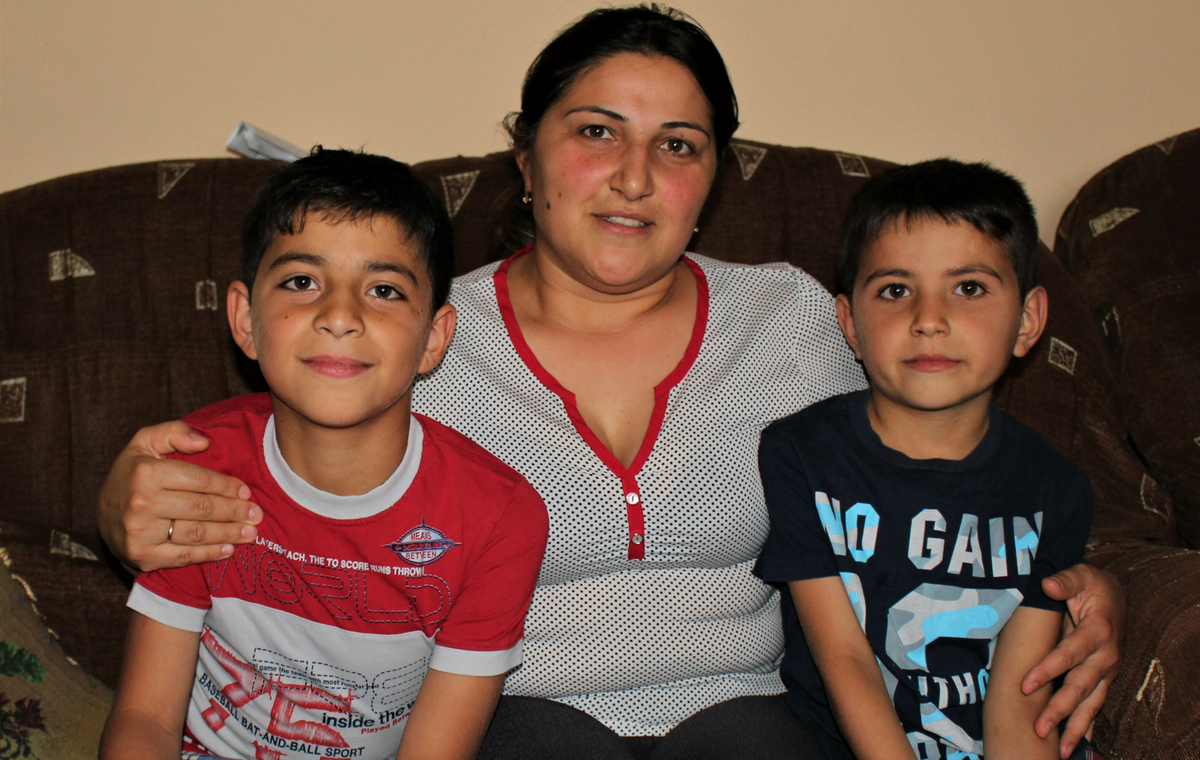"I educate the children of Artsakh, and my husband helps our soldiers with his medical skills. We feel needed here, we feel important, we know we are making a difference every day. How many people can say that?".
In 2004, the Tufenkian Foundation started building Arajamugh, a border village in Artsakh's South. Now, more than 100 people live here. They have come from all over Artsakh and Armenia to repopulate these liberated lands and build new lives. Nelli is one of them.
Arajamugh is a village like no other. Built just 12 years ago, it is yet to create its local myths and legends; however, to form its traditions, habits, and rituals, again to write its story. Unlike most other villages in Artsakh, the people of Arajamugh don't share the same family history – instead, they come from many different backgrounds and many different locations.
35-year-old Nelli Bejanyan came here from another village in Hadrut, not too far from Arajamugh. Nelli, a mother of two small boys, made a move in September 2006, when the town was only in its second year of being built.
In 2004, when Arajamugh was founded, Nelli and her husband had been thinking of moving someplace else for some time already. "Our life was never easy and never stable. Because my husband worked in Jebrayil [army base near Arajamugh], we were often apart. This wasn't good for our family for our children. We knew we needed to change this". When they first heard about a new village being built in Hadrut, and about the conditions there, it seemed too good to be true. "It was exactly what we wanted – a chance for a fresh start." The village's location was especially convenient for the family since, at the time, her husband worked in the nearby army base. Moreover, the town would soon have a school, and Nelli was a school teacher.
The first year after moving to Arajamugh was the hardest. The school hadn't been built yet, so Nelli had to wait until 2007 to start working. At first, she taught Armenian language and literature and was later promoted to be the school's deputy headmaster. Before moving to Arajamugh, Nelli already had experience teaching in school. She taught in the secondary school of Mets Tagher for one and a half years. "Working in a school is never boring. People may think otherwise because we are in a border village, but the school is pretty demanding of its students. We expect every child to give their best, and we expect the same of every teacher".
Nelli, her husband and two sons - 13-year-old Gevorg and 10-year-old Aren – were among the first residents of the newly built village. Arajamugh was in its early stage of development, there was active construction going on, and as Nelli put it, "the village was still gaining shape." Starting a new life is never easy, especially in a village in its first years of being built. Like many of her neighbors, the early years after moving this new village were filled with hope, with anticipation for Arajamugh to turn into a real town, with all the joys of village life.
Over the years, Arajamugh grew bigger and bigger, more and more children were born, more and more families moved here, and Nelli witnessed it all. "I have lived here for 12 years. I have raised my children here. I have helped turn this village into what it is now, and the village has turned me into who I am now. We have grown together, that's a connection you can't break".
Living in this border village might even seem dangerous to many people. Nelli, whose husband works in the army, hears stories of soldiers falling or getting wounded while protecting the border, living in this exact village is an issue of principle. "Our soldiers gave their lives to liberate these lands, and so much hard work was put into building this village. Now, we need to make sure that Arajamugh lives on, and that more and more new villages and, why not towns, are built on these lands".
The one difficulty Nelli faces now is the lack of activities and opportunities for children. During the summer break, when there is no school, and it's too hot to spend time outdoors, children are confined to their homes. "My children are creative, and most of the time, they find something to do, something to build, or something to destroy (laughs). But, I wish there were some kinds of organized activities, like art classes or sports."
As the Tufenkian Foundation built the village, we also provided small lands adjacent to each house in Arajamugh. Most villagers cultivate these lands to grow fruits and vegetables. When she is not in school, Nelli spends a lot of time farming and gardening in her small ground.
Nelli is very close to her neighbors. "Our lives are intertwined in many ways. Being so far from other villages, we depend on each other for many things". This closeness is one of the charms of Arajamugh, and one of the reasons people don't leave the village.
All her dreams for her children are tied to Arajamugh now. "I hope that Arajamugh continues to grow and develop, so it can provide young people with opportunities to stay and work here. Mets Tagher is my hometown, but Arajamugh is the hometown of my children, and I hope they never have to leave their hometown, that they stay and live their lives here."
